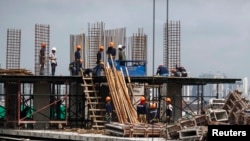The Thai military government is pushing for information technology improvements and stronger economic ties across southeast Asia as part of a series of economic reforms. Analysts say the plans mark a shift from the country's traditional manufacturing and export driven growth, a foundation of development over recent decades.
The push to boost Thailand's standing in global information and digital technology is a key recommendation by senior economic advisors to the military government.
Central bank monetary policy committee member and government advisor Narongchai Akrasanee said efforts to promote digital technology are needed to lift economic efficiencies.
"We want to see the knowledge [based] economy taking place in Thailand. A crucial factor affecting the knowledge-based economy is the digitalization of the society. And when you look at our digital management system, which is in place at the moment, it in a mess," said Akrasanee.
World Economic Forum reports on global competitiveness rank Thailand poorly in the extent governments, businesses and consumers use connectivity technologies aimed at boosting social and economic prosperity.
In the region, Thailand ranks slightly ahead of China and the Philippines, but well below Malaysia, Singapore and Korea.
Narongchai said the government is basing its economic program largely on the latest four year plan that had been adopted by the former civilian government under then-Prime Minister Yingluck Shinawatra, whose administration was ousted in the May 22 military coup.
The plan by the National Economic and Social Development Board (NESDB) called for boosting economic and trading connections across Cambodia, Laos, Myanmar, Thailand, Vietnam and Yunnan Province in Southern China.
Narongchai said promoting these economic links is a priority. "The new engine of growth would be regional development, in connection with the neighboring countries with the Greater Mekong Subregion development. If you look at the 11th [NESDB] plan, connectivity is the top priority. That is why you see that economic zone being set up, that is why you see committees on ASEAN, this is a prelude to things the government will be doing," he said.
The Board recently forecast the Thai economy to grow by at least two percent this year, after falling into recession in the first quarter amid political instability and conflict. The central bank said it expects growth of more than five percent in 2015.
But Phatra Securities Director Supavud Saicheau said the country needs a cohesive economic plan as it faces political uncertainties and an expected general election in 2015.
"Things have been done a little bit more fragmented, rather than totally orchestrated in a particular direction. It seems that there is not an economic road map which in my mind is simply, 'How does Thailand make a living in the next 10 years?' We have been making a living by exploiting the Eastern Seaboard [industrial area] as a basis for manufacturing," Saicheau said. "But are we going to continue on that path going forward?"
The military said the goal is to transform the economy, promoting more value-added production and service industries. Thailand already faces labor shortages relying on migrant workers in many export industries. Planned reforms also include the taxation system, an overhaul of state run enterprises and improving governance.
Thailand's Military Considering Long-Term Reforms for Economy
- By Ron Corben

BANGKOK —





